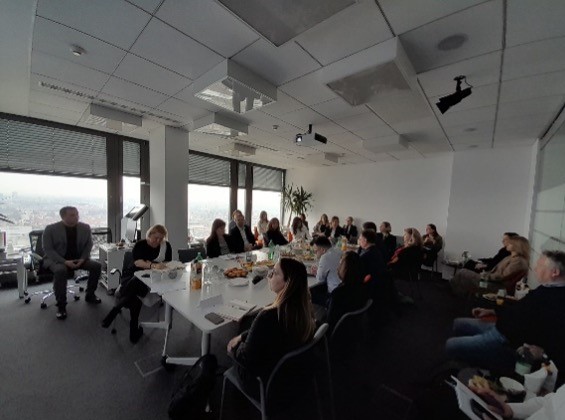The national roundtable session took place on February 28, 2024, at the premises of the Zagreb Stock Exchange, located at Ivana Lučića 2a, Zagreb, Croatia.
Institutions represented include pertinent public authorities (ministries and agencies), commercial and development banks, stakeholders from capital markets, consultancy services, and members of entrepreneurial associations representing the finance industry, as well as the construction and building sectors (including SMEs, large corporations, and State-owned enterprises). The consortium’s objective is to facilitate a national dialogue among interested parties involved in the formulation of national policies and initiatives aimed at enhancing energy efficiency in public buildings, multi-apartment residences, family houses, and the entrepreneurial tertiary sector.
The event commenced with Hrvoje Maras from REGEA introducing Mrs. Ivana Gažić, CEO of the Zagreb Stock Exchange (ZSE), who discussed the state of national capital markets and upcoming regulations regarding green bond financing. ZSE stressed the necessity for institutional investors to support climate-related and sustainability-linked projects in Croatian capital markets. The Ministry of Finance highlighted sustainable financing as a priority and announced the establishment of a new Department for Sustainable Finance to align with global climate action initiatives.
Challenges were addressed, particularly regarding financing solutions for energy renovation projects in multi-apartment buildings and households, with emphasis on the socioeconomic impacts and the vulnerability of property owners. Financial and banking representatives discussed difficulties in calculating portfolio risks and monitoring investments in green projects, proposing combinations of grants and financial instruments to address funding gaps.
Discussions also covered the fiscal treatment of energy efficiency projects for public authorities, emphasizing the need for transparent methodologies to manage long-term financial commitments effectively. The importance of a holistic approach to building industry issues, considering wider socio-economic profitability, was underscored by NRT members.
Concerns were raised regarding the lack of publicly available data on building renovation needs and financial investments, prompting calls for improved data transparency. The need for comprehensive one-stop-shop solutions for building renovation services was emphasized, with examples provided from both regional and EU contexts. Suggestions were made for the establishment of a national-level one-stop-shop supported by sustainable business models.
The meeting concluded with plans for the next National Roundtable, aiming to further discussions and collaboration among NRT members. Overall, the event highlighted the importance of sustainable financing, addressing challenges in building renovation, and the necessity for coordinated efforts across sectors to achieve climate and sustainability goals.
